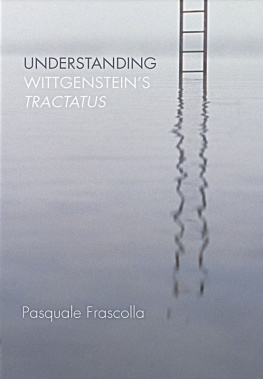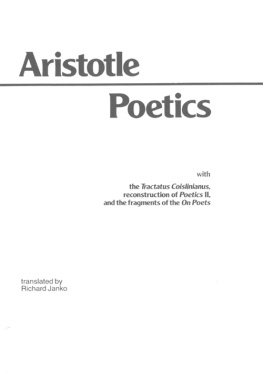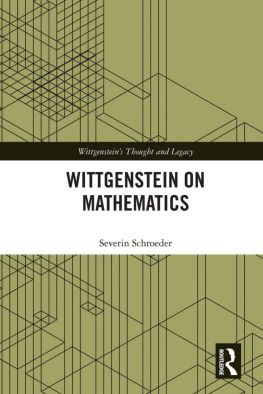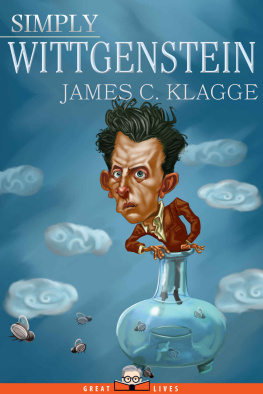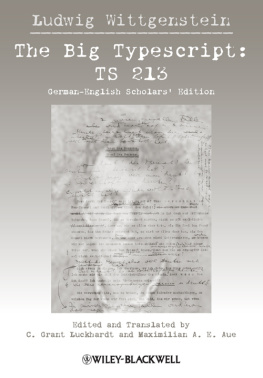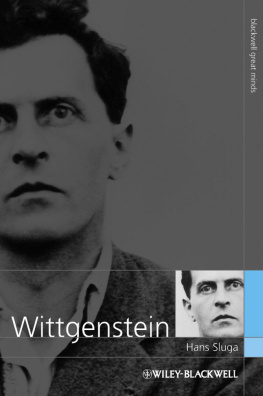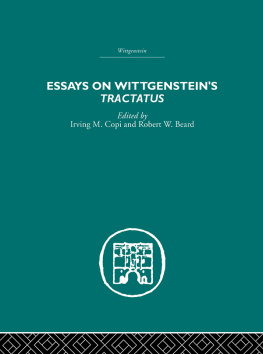Frascolla - Understanding Wittgensteins Tractatus
Here you can read online Frascolla - Understanding Wittgensteins Tractatus full text of the book (entire story) in english for free. Download pdf and epub, get meaning, cover and reviews about this ebook. publisher: Routledge, genre: Religion. Description of the work, (preface) as well as reviews are available. Best literature library LitArk.com created for fans of good reading and offers a wide selection of genres:
Romance novel
Science fiction
Adventure
Detective
Science
History
Home and family
Prose
Art
Politics
Computer
Non-fiction
Religion
Business
Children
Humor
Choose a favorite category and find really read worthwhile books. Enjoy immersion in the world of imagination, feel the emotions of the characters or learn something new for yourself, make an fascinating discovery.
Understanding Wittgensteins Tractatus: summary, description and annotation
We offer to read an annotation, description, summary or preface (depends on what the author of the book "Understanding Wittgensteins Tractatus" wrote himself). If you haven't found the necessary information about the book — write in the comments, we will try to find it.
Understanding Wittgensteins Tractatus — read online for free the complete book (whole text) full work
Below is the text of the book, divided by pages. System saving the place of the last page read, allows you to conveniently read the book "Understanding Wittgensteins Tractatus" online for free, without having to search again every time where you left off. Put a bookmark, and you can go to the page where you finished reading at any time.
Font size:
Interval:
Bookmark:
TRACTATUS
Understanding Wittgenstein's Tractatus provides an accessible and yet novel discussion of all the major themes of the Tractatus.
The book starts by setting out the history and structure of the Tractatus.It then investigates the two main dimensions of the early Wittgenstein's thought, corresponding to the division between what language can say by means of its propositions and what language can only show. It goes on to discuss picture theory, logical atomism, extensionality, truth-functions and truth-operations, semantics, metalogic and mathematics, solipsism and value, metaphysics, and finally, Wittgenstein's idea of the duty of maintaining silence.
Frascolla also proposes a new interpretation of the ontology of the Tractatus. Based on the identification of objects with qualia, the argument put forward in the book challenges the currently prevalent ideas of the New Wittgenstein. The paradoxical nature of the Tractatus itself, and the theme of throwing away the ladder, are thus revisited in a new key.
Understanding Wittgenstein's Tractatus is essential reading for anyone wishing to further their insight into one of the most influential works of twentieth-century philosophy.
Pasquale Frascolla is professor in philosophy of language at the University of Basilicata, Italy. He is the author of Wittgenstein's Philosophy of Mathematics, Routledge (1994).
WITTGENSTEIN'S TRACTATUS

First published 2000 in Italian as Il Tractatus logico-philosophicus di
Wittgenstein: Introduzione alla lettura by Carocci editore, via Sardegna
50, 00187 Roma, Italy
English translation as Understanding Wittgenstein's Tractatus first
published 2007
by Routledge
2 Park Square, Milton Park, Abingdon, Oxon OX14 4RN
Simultaneously published in the USA and Canada
by Routledge
270 Madison Ave, New York, NY 10016
Routledge is an imprint of the Taylor & Francis Group
This edition published in the Taylor & Francis e-Library, 2006.
To purchase your own copy of this or any of Taylor & Francis or Routledge's
collection of thousands of eBooks please go to www.eBookstore.tandf.co.uk.
Il Tractatus logico-philosophicus di Wittgenstein: Introduzione alla lettura
2000 Carocci editore
Understanding Wittgenstein's Tractatus 2007 Routledge
All rights reserved. No part of this book may be reprinted or reproduced
or utilised in any form or by any electronic, mechanical, or other means,
now known or hereafter invented, including photocopying and recording,
or in any information storage or retrieval system, without permission in
writing from the publishers.
British Library Cataloguing in Publication Data
A catalogue record for this book is available from the British Library
Library of Congress Cataloging in Publication Data
A catalog record for this book has been requested
ISBN 0-203-39075-X Master e-book ISBN
ISBN10: 0-415-32791-1 (Print Edition)
ISBN13: 978-0-415-32791-6
ISBN13: 978-0-203-39075-7 (ebk)
I have sometimes thought that what makes a man's work classic is often just this multiplicity, which invites and at the same time resists our craving for clear understanding.
G.H. von Wright
The English edition of this text differs in several respects from the original in Italian. The most important differences, however, come from having developed, in the English version, a new interpretation of the ontology of the Tractatus. This interpretation is the result of research I have carried out since the publication of the Italian text, and has appeared in part in several articles I have published during this period. The conjecture I put forward is that in Wittgenstein's version of logical atomism, which certainly not by chance he expressed somewhat elliptically, objects are to be identified with repeatable phenomenal qualities (qualia, in Nelson Goodman's sense of the word), and states of affairs are to be identified with the phenomenal complexes belonging to the various sense realms (visual complexes, auditory complexes, etc.). It goes without saying that the proposal needs to be evaluated with regard to its capacity to give order to that intricate ontological tangle which is to be found in the Tractatus, but it is precisely here, in my opinion, that it reveals its merits: it sheds light on some sections of Wittgenstein's masterpiece which up to now have remained obscure, and it gives coherence to many of his statements which up to now have seemed disconnected, if not entirely contradictory.
Developing this new conjecture in the English version was not a question of simply inserting it into the translated Italian text. Rather, my new ideas concerning the nature of objects and states of affairs had what might be called a systemic effect on the original text, making it necessary to give radically new interpretations to many sections of the Tractatus, some of which do not immediately belong to the group specially devoted to ontology. The parts of the book which have been affected most are the paragraph dedicated to elementary propositions (the first paragraph of .
In the final analysis, it is the reader who will judge to what degree my attempts have been successful. One thing, however, is certain: if the current fashion of Wittgenstein studies is represented by the so-called New Wittgenstein, then my approach will seem terribly out of fashion, and will appear to be out of sync with the times. On the other hand, if my approach, which might safely be called an Old Wittgenstein approach, proves to have deeply penetrated the spirit and the letter of the Tractatus, then this interpretation will provide an excellent demonstration of just how mistaken and sterile the present fashion is.
In the interval between the publication of the book in Italy and the completion of this new edition in English, I have had many opportunities, both public and private, to discuss my ideas, not only with authoritative scholars of Wittgenstein but also with eminent philosophers of language, and these discussions have benefited me enormously in my effort to make the guiding principles of my reading of the Tractatus more precise. There have been, of course, so many people who have contributed to clarifying my ideas that I cannot here begin to thank them all. Nonetheless, I would like to give particular thanks to my doctoral student, Giorgio Lando, who has been an inestimable and stimulating source of much-appreciated and penetrating comments. I would also like to thank Samuel Porter Whitsitt, who has tirelessly shared with me the onerous task of translating/revising this edition in English. And lastly, I am grateful to Routledge's editorial staff for their patience and forbearance in waiting for the completion of this volume.
Pasquale Frascolla
January 2006
With little risk of exaggerating, one could apply to Wittgenstein's Tractatus what Euclid is supposed to have said to Ptolomy when asked for a simple introduction to geometry: there is no royal road that leads to this science. A simple introduction to the Tractatus logico-philosophicus is, in fact, just as impossible. But it must be noted that this is not due to the technicalities of questions concerning semantic theory, logic, the foundations of mathematics, the theory of probability, etc., which are all dealt with in the
Font size:
Interval:
Bookmark:
Similar books «Understanding Wittgensteins Tractatus»
Look at similar books to Understanding Wittgensteins Tractatus. We have selected literature similar in name and meaning in the hope of providing readers with more options to find new, interesting, not yet read works.
Discussion, reviews of the book Understanding Wittgensteins Tractatus and just readers' own opinions. Leave your comments, write what you think about the work, its meaning or the main characters. Specify what exactly you liked and what you didn't like, and why you think so.

